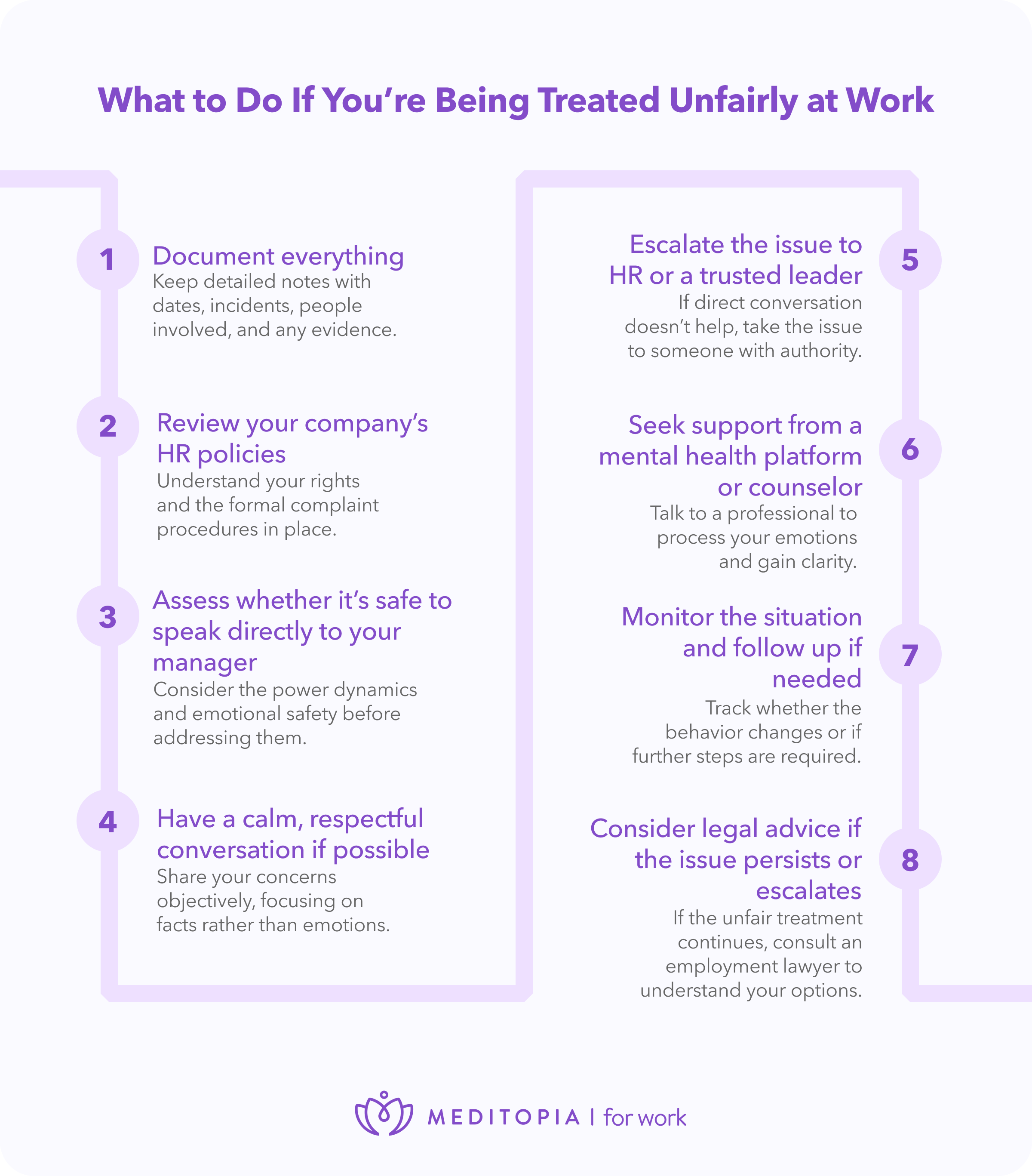Feeling left out of key decisions, constantly criticized while others are praised, or passed over for promotions without explanation? If so, you’re not imagining things, you might be being treated unfairly at work, and you’re not alone. The good news? There are clear steps you can take to protect your well-being and reclaim control.
What Does “Unfair Treatment” at Work Really Mean?
Unfair treatment at work refers to any situation where an employee is consistently handled differently, and more negatively, than their peers, without clear justification.
It’s not just about personal disagreements or isolated incidents. It’s about patterns of bias, favoritism, or workplace discrimination that affect your professional growth, emotional safety, and sense of belonging.
Here are some common examples of unfairness at work:
- Exclusion: Being left out of meetings, projects, or team communications that others are included in
- Inconsistent discipline: Receiving harsher penalties or stricter rules compared to colleagues for the same mistakes
- Public criticism: Getting told off at work in front of others while peers are corrected privately
- Overlooked for promotions: Being repeatedly passed over despite meeting qualifications, with little or no feedback
These patterns can be subtle, but over time, they send a clear message: you’re not being treated with the same respect or opportunity as others. And that’s a problem, not just for your performance, but for your mental health and job satisfaction.
Examples of Being Treated Unfairly at Work
It’s not always easy to tell the difference between a tough work environment and truly being unfairly treated at work. But when certain behaviors repeat over time and only seem to apply to you, not your coworkers, that’s a red flag.
Here are some realistic examples of being treated unfairly at work that might sound familiar.
While the table highlights structured, repeated patterns of unfairness, many employees also describe their experiences in more personal, everyday terms. These might sound like:
- Getting told off at work while others aren’t
- Colleagues get flexibility, you don’t
- Your boss assigns you only routine tasks
- Others get promoted with less experience
- You’re excluded from key discussions
- My boss treats me differently than others
- You don’t know how to complain about unfair treatment at work
- Thinking about how to report your boss for unfair treatment, but feel stuck
If you’ve ever thought, "My boss treats me differently than others", or noticed that you're consistently treated differently at work, you may be facing a deeper issue than just office politics.
How Unfair Treatment Affects Your Mental Health
Being unfairly treated at work doesn't just stay at the office, it often follows you home, into your evenings, your sleep, and even your self-worth. If you’ve been feeling drained, on edge, or disconnected lately, know that you’re not overreacting. These are valid and common responses to a harmful work environment.
Here are some of the most common mental health impacts of workplace unfairness:
- Burnout: Constant stress and frustration can leave you mentally and physically exhausted, with no motivation to engage.
- Employees who feel they’re treated unfairly are 2.3 times more likely to experience high levels of burnout than those who feel treated fairly [1].
- Anxiety: When you’re unsure how you’ll be treated each day, even simple tasks can feel overwhelming
- Perceived workplace unfairness significantly predicted higher anxiety and depression symptoms among employees [2].
- Withdrawal: You may find yourself pulling back from coworkers, meetings, or social interactions to protect yourself-
- Research shows that unfair environments lead to reduced job satisfaction and lower organizational commitment [3].
- Sleep issues: Overthinking difficult conversations or unfair decisions can make it hard to wind down or get quality rest.
- Employees exposed to workplace incivility and unfair behavior report 20% worse sleep quality than others [4].
If any of these sound familiar, it doesn’t mean you’re weak, it means your mind is reacting to a challenging, and potentially toxic, situation. You can recommend Meditopia to your managers, and receive proper support through our personalized programs and 1-1 care.
What to Do If You’re Being Treated Unfairly at Work
Unfair treatment can leave you feeling stuck or powerless, but there are practical steps you can take to regain control and protect your well-being. Here’s a simple checklist to guide you through it:

- Start keeping a personal record: Write down what you’ve experienced (dates, people involved, what was said or done, and how it made you feel.) Having a clear record can help you reflect objectively and stay grounded if you choose to raise the issue later.
- Revisit your company’s policies: Take a moment to read your employee handbook or HR policies. Understanding how your organization approaches topics like fairness, performance feedback, or grievance procedures will help you feel more prepared and confident.
- Consider an open conversation with your manager: If you feel emotionally safe and ready, you might choose to speak directly with your manager. Focus on specific examples, use “I” statements, and aim for clarity rather than blame. Even a short, respectful conversation can sometimes bring positive change.
- Reach out to HR or a trusted leader: If the situation doesn’t improve or feels too difficult to address alone, your HR team or a trusted senior colleague can offer guidance. Approaching the conversation as a request for support (not a complaint) can foster more openness.
- Support others when you can: If you notice someone else being treated unfairly, let them know they’re not alone. A supportive comment or shared perspective can go a long way. When done respectfully, speaking up helps build a healthier, more inclusive workplace for everyone.
What NOT to Do When You Feel Treated Unfairly
When emotions run high, it’s natural to want to react quickly. But certain responses can make the situation harder to resolve and may harm your professional reputation. Here are a few things to avoid when dealing with unfair treatment at work:
- Don’t gossip or vent publicly: Talking negatively about your manager or colleagues to others can escalate conflict and damage trust.
- Don’t confront in anger: Heated conversations rarely lead to productive outcomes. Give yourself time to cool down before addressing the issue.
- Don’t ignore or minimize the problem: Hoping it will go away often makes patterns of unfairness worse over time.
- Don’t make assumptions without facts: Stick to specific examples instead of drawing conclusions about intent or motives.
- Don’t handle everything alone: Isolating yourself can increase stress. Seeking support from HR, a trusted colleague, or a mental health professional is a healthier path forward.
How to Talk to HR About Unfair Treatment
Yes, this is something anybody likes to do. But it is necessary. Your HR department is there to support a healthy workplace, and starting the conversation doesn’t have to be confrontational. Here are a few tips and talking points to help you approach the conversation with confidence:
- Stick to the facts:
- “I’d like to talk about something that’s been affecting my experience at work. I’ve noticed a few patterns I’d like to share with you.”
- Keep the focus on what happened, not on personal opinions.
- Describe specific examples:
- “For example, during team meetings, I’ve been given public feedback for minor errors, while similar feedback for others is shared privately.”
- Details make your case stronger.
- Ask open-ended questions:
- “I want to make sure I handle this in the right way. What do you recommend as the best next step?”
- This shows you’re looking for solutions, not blame.
- Clarify expectations:
- “How does the company typically approach these kinds of concerns through the HR complaint process?”
- Understanding the process will help you feel prepared.
- Stay calm and professional:
- “My goal here is to find a constructive solution. I really value my role and the team, and I’d like to understand how we can move forward.”
- Tone matters as much as words.
- Bring documentation if possible:
- Sharing notes of dates, times, and what was said or done helps HR see the patterns more clearly and gives weight to your concern.
- Be clear about impact:
- Explain how the treatment is affecting your work, well-being, or motivation.
- HR responds best when they understand the practical consequences.
- Express openness to solutions:
- Let HR know you’re flexible: “I’d be open to feedback or training opportunities if that’s part of the solution.”
- This frames you as collaborative.
- Ask for confidentiality:
- If you’re worried about retaliation or tension with your manager, politely ask how your concerns will be handled discreetly.
- Request follow-up:
- End the conversation with: “Could we schedule a follow-up in a few weeks to check on progress?”
- This ensures accountability and shows you’re serious about improvement.
If the conversation feels emotionally difficult, you can also request a follow-up meeting to continue the dialogue after you've had more time to reflect. Framing your concerns as a request for conflict resolution, rather than an accusation, often leads to more collaborative outcomes.
Remember, raising a concern doesn’t make you a problem, it makes you someone who cares about fairness and improvement.
When to Consider Outside Support
If you’ve tried to address the issue internally and things haven’t improved, or if the experience is deeply affecting your well-being, it may be time to look beyond your workplace for help.
You don’t need to wait for things to get worse. If you’re being treated differently at work, or simply feel treated badly at work, you have every right to seek support. Here are a few options to consider:
- Mental health platforms: Services like Meditopia offer confidential, professional support to help you manage stress, anxiety, and workplace challenges — on your own terms.
- Employee advocacy organizations: These groups can provide guidance, peer support, and legal insight if you're navigating a toxic or discriminatory work environment.
- Employment lawyers or legal clinics: If your situation involves discrimination, retaliation, or a breach of your rights, a legal expert can help you understand your options.
If unfair treatment at work is taking a toll on your mental health, you're not alone, and you don't have to navigate it without support.
If your workplace doesn’t currently offer mental health services, you can be part of the change. Consider suggesting a solution like Meditopia for Work to your manager or HR team, so that support becomes available for you and your coworkers.
Speaking up for yourself is powerful. Asking for help is even stronger.











.jpg)











